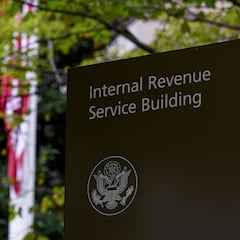Which states are giving bigger tax refunds in 2024?
Tax filers in some states will see larger returns this year thanks to reductions in tax rates, and the implementation on new tax credits and benefits.


As the tax season begins, we have researched and compiled a list of states that provide the most generous tax credits, rebates, and other benefits to their residents. If you are a resident of any of these states, taking advantage of these benefits is crucial.
Alabama
No substantive tax law is expected to change the state’s average return size during the 2024 tax season. AL.com has reported that refunds have fallen by 13 percent, from $1,997 in 2023 to $1,741 this year. However, the size is expected to increase in the coming months as more filers submit their returns and the distribution on the Earned Income Tax Credit and Child Tax Credit, which by law cannot be sent until after 27 February.
Alaska
Alaska does not impose taxes on income at the state level.
Arizona
This year, Arizona is offering residents the Arizona Families Tax Rebate. To receive the rebate, the taxpayer must:
- Submitted a full-year resident personal income tax return for tax year 2021
- Claimed a dependent on that return
- Filed as single, married filing separate, or Head of Household on their 2021 return
- Had a minimum of $1 in their personal income tax liability in tax year 2021, 2020, or 2019.
This tool, developed by the state’s tax authority, can be used to update your rebate address, make a claim, or check the status of your rebate. Those who meet the eligibility requirements will receive $250 for each dependent under 17 claimed on their tax return and/or $100 for those older than 17. No more than three dependents can be claimed, capping the value of the credit at $750.
Arkansas
In September, the Arkansas legislature passed a series of laws that are expected to lower the tax bills of most of the state’s residents this year. The top tax rate for individuals was reduced by 0.3 percent to 4.4 percent. Additionally, a one-time credit worth $150 will be made available to all taxpayers with an income of $89,600 or less in 2023. A less valuable credit will be made available to all those with incomes under $103,600.
Last year, the average refund distributed in the state was $1,762, and with the reduction in the tax rate, most filers can expect a larger check this year.
California
No new rebates, refunds, or credits have been approved for the 2024 tax season. No significant changes to the size of incomes are expected.
Colorado
No significant changes have been made to the state’s tax code to warrant major changes in the size of a filer’s revenue.
Connecticut
Like Arkansas, residents of Connecticut will also see decreases in the tax rates applied to their incomes by the state’s revenue authority.
The state has made some changes in its tax policies. The first $10,000 earned by a single filer or $20,000 for married couples filing jointly will be taxed at a lower rate of 2 percent instead of the previous 3 percent. Furthermore, the state has lowered the tax rate from 5 to 4.5 percent for the next $40,000 earned by single filers and the next $80,000 earned by joint filers. These changes will affect around one million of the state’s 3.6 million residents. The officials have also emphasized that they are working to reduce the tax burden of the middle class and will limit the benefits of the tax reductions for single filers earning over $150,000 or $300,000 for those filing jointly.
Delaware
No new rebates, refunds, or credits have been approved for the 2024 tax season. No significant changes to the size of incomes are expected.
Florida
Florida does not impose taxes on income at the state level.
Georgia
While no additional benefits are being offered to taxpayers this year, a 2022 law on 1 January 2024 eliminated the state’s progressive tax structure with a flat tax of 5.49 percent. The legislation decreases the rate at a consistent rate until it reaches 4.99 on 1 January 2029.
Hawaii
In Hawaii, lawmakers voted to double the value of the Earned Income Tax Credit and the Food Exercise Tax Credit. These credits are offered to the state’s “most economically vulnerable residents.”
.@GovJoshGreenMD just signed a bill that doubles the size of the EITC for five years, providing $50M in add'l support. Working families who struggle to pay for child care will get a credit of up to $3,000 to help w/expenses. #UnitedForALICE @AlohaUnitedWayhttps://t.co/JKW8AID7Fa pic.twitter.com/r19BTzRjeq
— United For ALICE (@United4ALICE) July 19, 2023
Idaho
The state will continue to offer some reductions to residents’ property tax bills this year. The program aims to help seniors, veterans, orphans, and disabled people and caps the annual income of beneficiaries at $37,000 a year.
Illinois
No new rebates, refunds, or credits have been approved for the 2024 tax season. No significant changes to the size of incomes are expected.
Indiana
No new rebates, refunds, or credits have been approved for the 2024 tax season. No significant changes to the size of incomes are expected.
Iowa
No new rebates, refunds, or credits have been approved for the 2024 tax season. No significant changes to the size of incomes are expected.
Kentucky
No new rebates, refunds, or credits have been approved for the 2024 tax season. No significant changes to the size of incomes are expected.
Louisiana
No new rebates, refunds, or credits have been approved for the 2024 tax season. No significant changes to the size of incomes are expected.
Maine
No new rebates, refunds, or credits have been approved for the 2024 tax season. No significant changes to the size of incomes are expected.
Maryland
No new rebates, refunds, or credits have been approved for the 2024 tax season. No significant changes to the size of incomes are expected.
Massachusetts
Some taxpayers in Massachusetts are likely to see an increase in the size of their refund with the state lowering a decrease on short-term gains from the sale or exchange of capital assets, reducing it from 12% to 8.5%. This change in tax rate applies to all taxpayers in the state.
Additionally, seniors aged 65 and above who own or rent a house in Massachusetts may be eligible to claim the Circuit Breaker Tax Credit. This credit is equal to the amount by which their total real estate tax payments, or 25% of their rent in the case of renters, exceed 10% of their total income, up to a certain amount. This year, eligible taxpayers will benefit from the statutory base amount being doubled, leading to an increase in the maximum value of the credit to $2,590.
With help from colleagues & MA DOR, here's a guide to the Senior Circuit Breaker Tax Credit for the upcoming tax season. Please share freely. I hope you & your loved ones find this useful. S/o to House Chair, Joint Cmte on Elder Affairs @RepStanley. https://t.co/6RCEkhkR8P pic.twitter.com/ovyYgioKqf
— Rep. Simon Cataldo (@RepSimonCataldo) January 30, 2024
More generally, renters will benefit from a deduction that “is equal to half of the rent paid for a principal residence located in Massachusetts.” For 2023, the deduction increased in value from $3,000 to $4,000 for single filers and from $1,500 to $2,000 for married couples filing jointly.
The legislature also approved a change to the tax code that increases the Commuter Deduction to cover fairs paid on or for:
- Massachusetts Bay Transit Authority (“MBTA”) fares
- Massachusetts regional transit authority fares
- fares for any commuter boat owned, operated, or contracted by a municipality, public or quasi-public entity, agency, or authority,
- bikeshare memberships,
- and the cost of bicycles purchased for commuting.
The state is offering a refundable Child and Family Tax credit to taxpayers who have children or other dependents. To be eligible, the children must be under the age of 13 or a dependent (including one’s spouse) who has a disability that makes them unable to care for themselves. This year, the credit is worth $310 for each dependent claimed, and there is no limit to the number of dependents that can be claimed on one’s tax return.
The state’s Earned Income Tax Credit will increase in value from thirty to forty percent of the federal credit (should they be eligible to claim that benefit).
More information on these changes and others can be found on the state tax authority’s website.
Michigan
The state of Michigan has decided to increase the value of the Earned Income Tax Credit for Working Families from six to thirty percent of the federal credit. To provide further assistance to those eligible to claim the credit, the state’s revenue authority will be distributing a supplementary check worth 24 percent of their federal 2022 EITC.
Minnesota
The state is introducing a credit worth $1,750 for parents and guardians who have children. There is no limit on the number of children that can be claimed. However, the full credit value applies only to taxpayers with an income below $29,500. For couples filing jointly, the income threshold is $35,000. After this threshold, the value of the credit begins to decrease.
The new Child Tax Credit, worth $1,750 per child, is available for parents to claim on their 2023 income tax returns. This refundable credit can be claimed even if you do not owe tax, but you must file a 2023 tax return to claim it. Learn more: https://t.co/xkrjEJkdr1#MNCTC pic.twitter.com/DGYaaGWgXy
— Minnesota Revenue (@MNRevenue) January 30, 2024
Mississippi
Mississippi taxpayers will notice that this year’s filing is a little different. The state is transitioning to a flat tax rate system and away from a progressive scheme. Now, a five percent tax will be levied on filers with an annual income over $10,000.
More information is available on the state tax authority’s website.
Missouri
No new rebates, refunds, or credits have been approved for the 2024 tax season.
Montana
Looking ahead slightly, the Property Tax Rebate, available to homeworkers, will reopen for claiming on 15 August 2024. Those hoping to claim the rebate will have until 1 October 2024, which will be worth up to $675. Eligibility information can be found on the state tax authority’s website.
Nebraska
No new rebates, refunds, or credits have been approved for the 2024 tax season.
Nevada
Nevada does not impose taxes on income at the state level.
New Hampshire
New Hampshire does not impose taxes on income at the state level.
New Jersey
New Jersey does not impose taxes on income at the state level.
New Mexico
No new rebates, refunds, or credits have been approved for the 2024 tax season.
New York
New York is another state that has reduced tax rates for some income groups:
- $13,900 and $80,650 (single filers)/$27,900 and $161,550 (joint filers) will be taxed at 5.5 percent
- $80,650 and $215,400 (single filers)/$161,500 and $323,200 (joint filers) will be taxed at 6 percent.
These decreases should help to lower the tax bill for those who fall within these income thresholds.
North Carolina
North Carolina has a flat tax rate system, and in 2023, tax on income fell from 4.99 to 4.75, which will lower the tax bill for many residents.
North Dakota
No new rebates, refunds, or credits have been approved for the 2024 tax season.
Ohio
No new rebates, refunds, or credits have been approved for the 2024 tax season.
Oklahoma
No new rebates, refunds, or credits have been approved for the 2024 tax season.
Oregon
In 2023, lawmakers in Oregon altered the structure of the state’s Oregon Kids Credit to make it fully refundable. This credit is available to individuals with an annual gross income of $25,000 or less. Parents or guardians can claim up to five dependent children between the ages of zero and five years old, and will receive a payment of $1,000 per child claimed. However, if your annual gross income exceeds $30,000, you will not be eligible for this credit. Please note that the credit is fully phased out at this income level.
Pennsylvania
Some homeowners and renters will be eligible to claim Pennsylvania Property Tax Rebate. The application has been opened, and those eligible will have until 30 June 2024 to make their claim. Eligibility varies by age, with those sixty-five and older, a widow or widower over fifty, or any disabled adult who can make a claim. One must own or rent a primary residence in the state and have an annual income below $45,000. The value of the credit depends on one’s income, with those falling in the lowest income tiers ($0 - $8000) seeing $1,000 returned and the minimum payment being $380. More information is available on the state revenue authority’s website.
Rhode Island
The only change to tax law in Rhode Island that went into effect in 2023 is that military service pension benefits can not be subtracted when calculating one’s income for their state-level return.
South Carolina
No new rebates, refunds, or credits have been approved for the 2024 tax season. No significant changes to the size of incomes are expected.
South Dakota
No new rebates, refunds, or credits have been approved for the 2024 tax season. No significant changes to the size of incomes are expected.
Tennessee
Tennessee does not impose taxes on income at the state level.
Texas
No new rebates, refunds, or credits have been approved for the 2024 tax season. No significant changes to the size of incomes are expected.
Utah
No new rebates, refunds, or credits have been approved for the 2024 tax season. No significant changes to the size of incomes are expected.
Vermont
No new rebates, refunds, or credits have been approved for the 2024 tax season. No significant changes to the size of incomes are expected.
Virginia
No new rebates, refunds, or credits have been approved for the 2024 tax season. No significant changes to the size of incomes are expected.
Washington
Washington does not impose taxes on income at the state level.
West Virginia
No new rebates, refunds, or credits have been approved for the 2024 tax season. No significant changes to the size of incomes are expected.
Wisconsin
Related stories
No new rebates, refunds, or credits have been approved for the 2024 tax season. No significant changes to the size of incomes are expected.
Wyoming
Wyoming does not impose taxes on income at the state level.


Complete your personal details to comment